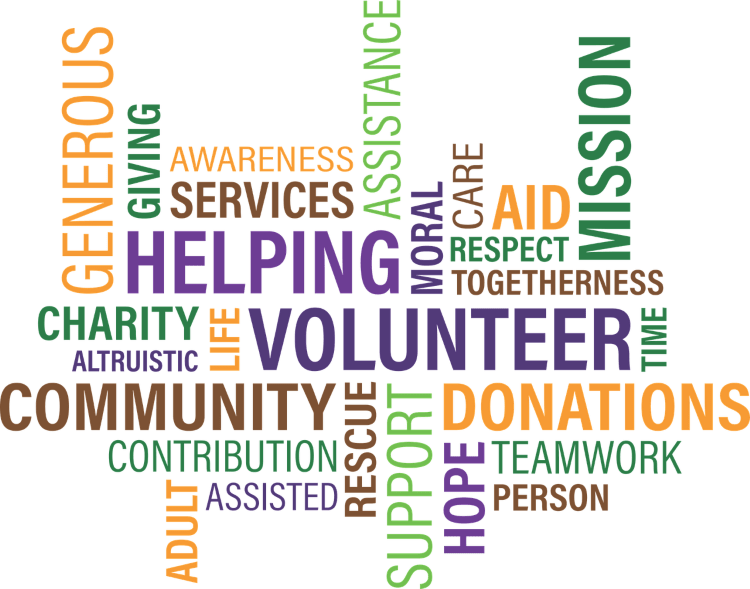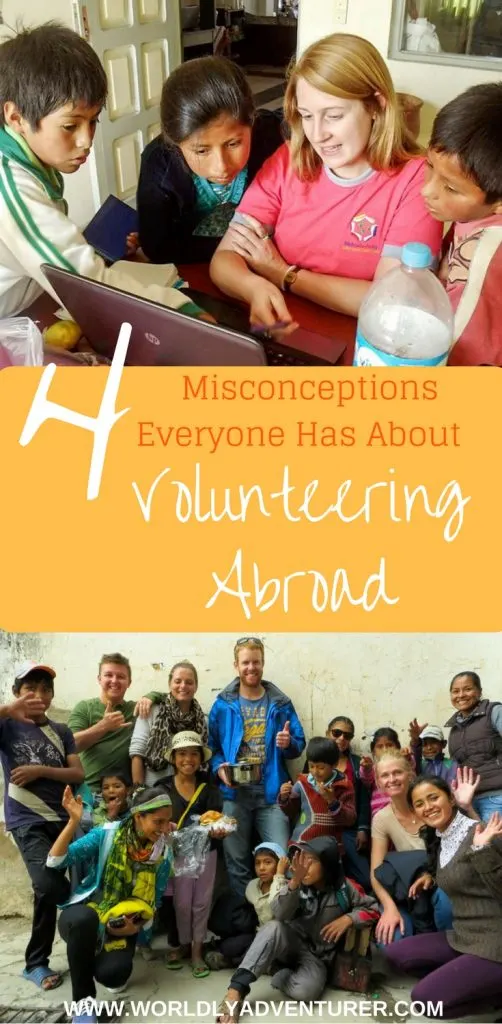Volunteering’s a great thing to do, right?
All those sad-looking children, or abused animals, just waiting for you to come and help them escape the hand that old lady luck has dealt.
You’ll change the world. You’ll inspire a whole community to dream bigger. You’ll become a hero.
Maybe not.
I’m not saying that volunteering is wrong per se. Neither do I wish to offend those who go into volunteering with these types of thoughts in their optimistic minds.
But we need a serious debate about how volunteering can work – and particularly that conversation needs to be directed (and include) those prospective volunteers themselves.
Why? Time and time again, I’ve seen how the ‘voluntourism’ debate rears its ugly head and you’ve got 18-year-olds heading off to Nepal to teach English to other 18-year-olds for a week, despite the former never having taught a class once before in their lives. Volunteering can become more about our Western ego and the need to “assuage the guilt of [our] privilege” than to actually change the world.

Surely there’s a better way to volunteer and support developing countries?
There is, but it requires you to take whatever preconceptions you might have about volunteering and confront them.
Grab them by the shoulders and shake them out of their blinkered state of rose-tinted optimism.
The quicker all of us recognise that the ideals that we take with us into volunteering are destined to fail, the quicker we can actually start having a teeny-weeny impact (and yup, that’s all you’ll ever have).
There’s no silver bullet.
You’re never going to be the volunteering equivalent of superman.
Get your pants back under your trousers and listen to some of my advice. While I’m no expert, I have seen what can and does, and what can’t and won’t, work. Here are the volunteering misconceptions that you need to confront.
Volunteering Misconception#1: You’ll have a huge effect and change lives
Reality: I’ve had very little impact over the 15 months I’ve spent volunteering
I’ve had a great time working with children and my fellow international volunteers. I’ve seen more of Peru and Bolivia than I otherwise would. But my overall impact? Negligible.
Part of the issue is the elephant in the room: sustainability. It’s the problem that however long you offer to donate your time, it’ll never be enough.
A high turnover of volunteers who need to be trained and helped to learn the ropes, who must get used to the cultural context in which their volunteering is set: this never bodes well for sustainability and long-term impact.
What actually benefits charities the most are local people working full-time in a role.
Unfortunately, this isn’t financially viable for an awful lot of charities. By engaging volunteers – and no way is this more powerful than if volunteers see the physical reality of the cause – it’s more likely that they will continue to support the charity, probably for a longer period of time than if they’d just donated money.
They can also help to raise awareness and support fundraising for years to come.
But, the truth of the matter being that, if organisations actually shifted their focus from trying to get volunteers, to getting those same people to donate the money they would have spent volunteering, they might be able to afford that local, permanent member of staff’s salary.
So when picking an organisation to help, think critically about how much you can bring to that organisation.
Would your money, as a donation, go further than the couple of weeks or months that it would afford you to volunteer?
If you want to volunteer, could you start with a long-term version of how you can contribute further into the future, all in the name of helping that charity pursue the elusive, yet critical, goal of sustainability?
#2: They look like they know what they’re doing, and the head office is in the US so they must be well-organised
Reality: Unless it’s locally operated, forget it
It doesn’t matter whether you only change one person’s life with a charity: that’s enough, right?
I once had the chair of an organisation utter that sentence to me. On principle, perhaps it’s true. Yes, changing one person’s life is better than no one’s.
But when we’re pumping thousands of dollars per year plus the money that volunteers have encouraged and coerced members of their close friends and family to donate, I’d like to think the impact would be more than one person.
And that’s the rub: a lot of charities that are run by boards in other countries and who exercise the ultimate control lose sight of the goals that the charity is trying to achieve.
I’ve also seen the external board pursuing completely different goals to those of their local employees thanks to a lack of communication and trust between the two groups.
For charities to work (and tick the happy sustainability box too), the parties most involved in the decision process need to be located in the country in which the charity operates.
Having an opinion from halfway around the world when you’ve not spent seven years living in the place in which you set up your organisation, is all well and good. But offering deaf ears to your eyes on the ground is a recipe for disaster.
All that can be hoped to be achieved in this case is a complete conflict of expectations and priorities.
This is where locally operated organisations come in.
The best example of practice I’ve seen has been in organisations where those who set up and run the charity work directly alongside their in-country staff.
In this case, not only do the founders have a shared investment in the community (as it is also their community), but they can use their expertise to develop the skill set of their staff.
Add into this the fact that they are working alongside their staff’s local knowledge and cultural understanding and BOOM: positive change can happen.
Communication and local insight are crucial in the development sector, but so often forgotten by leaders who lose sight of what they’re trying to achieve.
I’ve learned from my experiences that the organisations with whom I want to be involved are those where communication and listening are the most valued of skills.
There is no place for an ego in charity work, particularly not from the CEO. Organisations that are either locally based or have a real commitment to actively listening to their staff on the ground are the only ones that deserve your time.
#3: You can be an amazing volunteer even if you don’t speak the language
Reality: You can – but language skills can be so rewarding
When I first moved to Bolivia, I really didn’t think that not speaking Spanish would be an issue. Communication’s universal, right? Wrong.
Lacking the language skills to properly communicate with my Bolivian colleagues in the office put a real barrier between me and my capacity for effecting any change. It took a long time of patient Spanish study to really feel that I could be of much use.
That said, in some situations, not having the language skills is not the be all and end all. If someone within the volunteering group speaks well enough, or if one of the staff members speaks English, then communication doesn’t have to be too difficult.
As a TEFL teacher, often speaking less of the local language means you have to be more creative with your teaching methods which actually often becomes a real bonus.
But if you’re there to learn about the culture and the community, as well as to teach them something about your life too, you’ll have so many wasted opportunities, and come away wondering what things would have been like if you’d been able to communicate properly.
So give yourself time before volunteering to learn the language. Your experiences – and your impact – will increase dramatically.
And a new language is probably the most exciting, and significant take-home memento from travel that you can find.
#4: It’ll be all smiling children and clouds and happiness. Volunteering is easy and makes you feel warm and fuzzy inside!
Reality: Poverty and life outside of our own sugar-coated existences is tough and hard to deal with
Volunteering with working street children in Sucre, Bolivia, forced me to face up to inequality and injustice at its most stark and upsetting.
Just knowing that these young people were actually the lucky ones because they had families to return to – unlike the children I saw sleeping in cardboard boxes outside of the market – was a tough pill to swallow.
In Cusco, teaching at a home for young girls who had been raped and fallen pregnant, I watched as one of the girls, aged 12 and barely looking older than about eight, proceeded to breastfeed her baby daughter.
I have no issue with women breastfeeding in public, but it was the stark reality of that child’s life that left me struggling to fight the tears.
Again, she was one of the lucky ones in that she was receiving support and had a room in the centre rather than being on the street.
And I know that that moment was never – and shouldn’t have been – about me, but just realising how comfortable and cocooned my life had been up until that moment was a real moment of insight.
On reflection, that jolting awakening was one I needed to have.
I want to see the reality of the world and I strongly believe everyone should have to confront the painful inequality that exists and appears to even be growing globally.
But wow, these experiences can leave you questioning the very existence of humanity.
An editor for one of the online publications for which I write told me the other day that he had a lot of respect for the work I did in Bolivia, as he knew how emotionally draining it was to confront these levels of poverty, and admitted that he didn’t believe he could personally do it.
It was a very honest thing to say, and there is no shame in accepting that the conditions could perhaps be more extreme and more upsetting than you think you might be able to deal with.
That said, these are probably the types of organisations that most need your money, even if you can’t donate them your time.
Final Thoughts
I hope that these criticism or – as I’d like to think – honest critiques of volunteering don’t come across as completely negative.
I remain committed to the value of volunteering and believe that when done correctly, it is incredibly positive, fulfilling for all involved, and will make a real difference.
It just takes some consideration of your approach before you start. Go into volunteering, as Zahara Heckscher points out, with learning, rather than making change, at the top of your list.
Take the lessons you learn home and do something more with them. Don’t just file those experiences away alongside your holiday snaps.
Use them as an impetus to inspire you to lead changes in your home community, or to become a long-term player in the development sector.
Volunteering and a commitment to making the world a more equal place can never be a short-term, summer-long pledge. Realise that before you head out to save the world, and your experiences and impact are guaranteed to be far more powerful.
What have been your experiences of volunteering? I’d love to hear what you’ve got to say on this subject, so comment below to join in the conversation.
Found this article insightful? Share the love and Pin Me!


kristina
Friday 8th of September 2023
I volunteered as a peer support on a mental health site. I had questions about a few difficult chats, and reached out to another volunteer. I was brutally bullied by this volunteer. I lost all self confidence and no longer felt that the site was safe. I left my position despite feeling that I had some success. It led me to question my values. While I sincerely wanted to be a support, I also enjoyed the satisfaction that I received in my connection to others. So the one that truly benefited was me.
Stephen Coady
Friday 4th of November 2022
Absolutely spot on. I volunteer because I think I can offer a bit of help. A bit. I like the adrenaline involved in the kind of volunteering I’ve done and I like getting out of the retirement dull day. I like some of the other volunteers and steer clear of drama and those who want photos holding babies to post online. I believe, again, I have helped some a bit and that’s good enough. I’ve stuck to volunteering for things that I enjoy doing. I honestly feel that if you want to volunteer, find something, anything you enjoy doing. I wouldn’t shoot for being Mother Teresa or a Nobel. I’ve met great and crappy people in difficult situations. It definitely isn’t for everyone.
VivaLaCassy
Sunday 4th of December 2016
Hey Steph;
My boyfriend and I really want to volunteer in South America- but honestly have no idea where to begin to look. In your opinion, should we find opportunities that match our skills and what is needed at the ground level rather than trying to research anything online?
We both want to add value to a community, but after reading your opinion piece here, I don't want to jump into an organization that really only benefits, well, me....
Stephen Coady
Friday 4th of November 2022
@VivaLaCassy, Good for you for stepping back and considering the reality of what you hope to do and why. If possible, find people returning from similar volunteer positions. I volunteered a few times overseas and both contributed - bandaid work which is fine - and had wasted time periods. I realized that my airfare and expenses for a third round made no sense because a small very committed group already there needed the money. They had skills and knowledge way beyond mine. It doesn’t mean that is always the case. I met many very good and useful volunteers and many more who really were very limited and sometimes, in the way. If you really feel compelled, find a group that actually seeks more hands. Sometimes that might be grunt work that they really need help with. Also, it’s OK to wait awhile. Good luck.
Steph Dyson
Sunday 4th of December 2016
Hey Cassy, I think that finding things online can be really good actually, but yes, you have to think carefully about your skills and how they fit with what the organisation needs. You can definitely come across organisations as you travel but I actually think that's harder because a lot of them you won't necessarily hear about from other travellers, particularly those located in some of the most interesting places. Check out my article the Definitive Guide to Volunteering in South America as this'll start you off with websites to use and the organisations that you can get in contact with. Ultimately, if you want to work with kids or be mindful about really making a difference then the best thing you can do is choose to stay a few months. Bear in mind volunteering and helping with things like social media or fundraising and marketing don't require you to spend too long with the charity (you could potentially train someone up and help them sort out a strategy) but still allow you to volunteer and work with people. Let me know what you guys decide to do!
Alisa
Tuesday 19th of July 2016
I 100% agree with this! I actually haven't done any volunteering overseas, but I did work for a non-profit organization that received grant money to do trainings in Africa and Southeast Asia for several years. We worked with a bunch of non-profits and government offices on the ground, and so much of what you stated rings true (including the sad fact that we were wasting a bunch of money on resources and travel that could have been used for bigger and better things). I think once people really reflect on what they can do to help (and that it won't be a whole lot, unfortunately), what their skill sets are, and how they can best make a difference, their experience will be a lot more fulfilling and useful to everyone else around them. Great post!
Steph Dyson
Wednesday 20th of July 2016
Thanks Alisa! Yeh I completely agree that it's all about personal reflection and that even with the best of intentions, you probably won't achieve even a small part of what you might have intended. Hopefully we can provoke a bit of debate on the subject and get prospective volunteers and charities to think about their approaches. :)